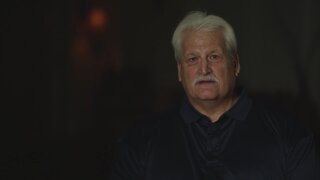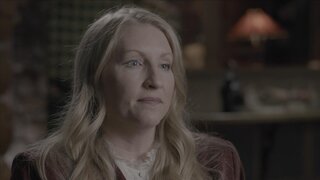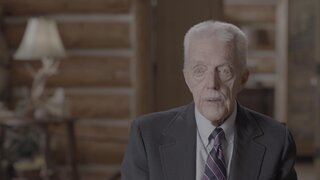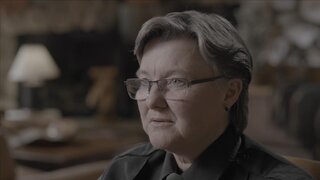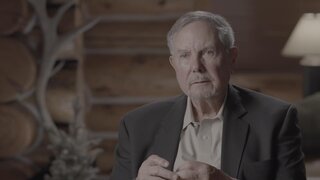'How Not To Commit A Crime': Florida Man Found Buried In Meat Freezer After Friend Murdered Him
The body of Donal "Dee" O'Sullivan was found in a deep freezer buried on a rural property in Canaveral Groves, Florida.
A likable and successful entrepreneur befriended a group of young skateboarders before disappearing from his Florida home, leaving his friends puzzled and investigators hard at work.
Melbourne is a low-key town in the heart of Florida’s space coast, a place where residents felt safe in their beach town community. In the early 1990s, it was a surfer and skater’s paradise, a popular spot for young outsiders looking for fellowship with like-minded people. A ragtag group of skaters could often be found at the Sun Shoppe & Cafe, where 42-year-old Donal O’Sullivan seemed to find his people.
“Everybody called him ‘Dee,’ no one called him Donal,” his friend Kris Dysert told “Buried in The Backyard,” airing Thursdays at 8/7c on Oxygen. “He was super nice, and he just fell into our gutter-punk circle of friends pretty easily.”
O’Sullivan was a successful tech entrepreneur who retired early after creating a software company with his brother, Dennis. But despite his success, O’Sullivan suffered from bouts of depression. After moving from Georgia to Florida, he found his footing and formed an unlikely friendship with the new group of skateboarders.
But by September 1998, his friends noticed they hadn’t seen much of O’Sullivan. Dennis, fearing his brother may be experiencing a mental health crisis, called the police and asked them to check in. What initially caught their attention were large withdrawals from O’Sullivan’s bank account. A bank teller told authorities a younger male claiming to be O’Sullivan’s son made several attempts to cash checks in O’Sullivan’s name.
The family confirmed to police that Donal O’Sullivan had no children.
Dennis became further concerned when he received a call that an unknown person came by to collect O’Sullivan’s mail from his mail handler.
Authorities visited the Sun Shoppe & Café and questioned the missing man’s friends. All of them insisted they had no access to his bank accounts or mail, and were puzzled by O’Sullivan’s sudden absence.
“He was a grownup who didn’t tell you, ‘You’re not doing what you’re supposed to, study harder, where’s your ambition?’ He wanted to help you get there,” said Dysert. “You really started to worry that something is wrong.”
Finding no evident connection between O’Sullivan’s disappearance and the skaters, investigators went to O’Sullivan’s home. On the porch, they came upon a bag of cement and fresh gauge marks on the door and steps. Inside, tracks like those belonging to a dolly were impressed on the linoleum floor. The marks led upstairs.
“As we got up to the second floor, there was a bedroom,” said Detective Michael Casey of the Melbourne Police Department. “And inside of that bedroom, there was a single mattress. Underneath the mattress and on the carpet, there was what appeared to be an alarming amount of blood.”
Casey said upon discovering blood, there was “no doubt” that the case went from a missing person case to a murder investigation. Investigators continued to search O’Sullivan’s home. Downstairs, they found bins typically found inside a deep freezer.
“We looked around the residence; there was no meat freezer,” said crime scene investigator Scott Dwyer. “That was kind of strange.”
Another clue was a receipt they found in a pile of O’Sullivan’s papers for a freezer purchased at an appliance store. The name on the order was Eric Marshall.
Investigators wondered if Eric Marshall was the same gentleman attempting to cash O’Sullivan’s checks and collect his mail.
Appliance store employees distinctly remembered Eric Marshall because several attempts to call him over the loudspeaker went ignored. At their final attempt to notify the customer that his order was available for pick up, an associate joked that his “body freezer” was ready, angering Marshall.
Though authorities could find no Eric Marshall, a lead came when a witness at the bank recognized the young man trying to cash checks in O’Sullivan’s name. The man pretending to be O’Sullivan’s son was 26-year-old Daniel Tennity, one of the skateboarders in O’Sullivan’s ragtag group of friends.
Tennity joined the crowd after moving from New York to Florida in search of a fresh start. He’d known fellow skater Durke Schmidt from up north and abruptly showed up on his doorstep looking for work.
Police learned O’Sullivan paid for the rent on a house occupied by Tennity and another friend.
“They were living in a house next to Shacktown that was just atrocious,” said O’Sullivan’s friend Durke Schmidt. “They had this one house on Pine Street that they liked, but they couldn’t pass a credit check. So Donal was like, ‘We’ll just rent the house and put the stuff in my name, so you guys have a place to stay.’”
Investigators went to the rented home, where the roommate said Tennity had just gotten out of prison up in New York after serving time for a burglary conviction. Tennity’s mere presence in Florida was a parole violation. Though it didn’t make him a killer, it was enough to place him under arrest.
“We returned to the property,” according to Casey, who said the roommate told them Tennity wasn’t home. “While he was talking to the officers, he kept pointing to the back of the room.”
Police found Tennity in the shower and arrested him on site.
In a taped interrogation, Tennity told detectives that he was at the bank because he worked for O’Sullivan by running frivolous errands and was just trying to cash his paychecks.
“He told me, ‘Just deposit the money in your account from mine,’” said Tennity. “To pay me for all the work I’ve been doing.”
Shortly after questioning, police got a call that turned everything upside down: It was Durke Schmidt, who told detectives he’d received a call from Tennity from the county jail.
“Dan asked me to grab his bible and rosary beads and send it to his mom back in Rochester,” said Schmidt. “And when I opened the bible, that’s when I realized inside the bible was Donal’s credit cards, Donal’s license, some money, and bank checks. That was when I realized something wasn’t right.”
Schmidt and Tennity’s roommate searched the rented house for more clues, finding an empty oatmeal cylinder containing a peculiar land deed forged in Tennity’s name. The property itself was a rural plot north of Melbourne, purchased with thousands of dollars in money stolen from O’Sullivan’s account.
“We were able to pull up some financial transactions. One was the rental of a backhoe … rented by a check by Donal O’Sullivan,” said Detective Casey. “And the address to deliver the backhoe matched the location on the deed.”
Authorities visited the Canaveral Groves address, a remote plot surrounded by orange groves. When they found nothing on foot, they deployed a helicopter to get an aerial shot of the property. From above, they found a disturbance in a small area in the earth.
On Oct. 19, 1998, authorities unearthed a deep freezer buried beneath the sand-like dirt with the decomposing remains of Donal O’Sullivan inside. The victim was wrapped in a sleeping bag with his hands cuffed behind his back and telephone cord binding his legs. The perpetrator filled the interior of the freezer with cement.
“That freezer was merely used as a coffin,” said Casey.
The freezer matched the serial number from the one purchased at the appliance store, and employees were able to pick Tennity out of a photo lineup as the man claiming to be Eric Marshall.
Tennity unknowingly helped secure his own conviction when he bragged to other cellmates at the jail that he killed Donal O’Sullivan.
Prosecutors and investigators believed O’Sullivan caught Tennity stealing checks and confronted him. Tennity admitted to strangling O’Sullivan to death during the ensuing physical altercation. Tennity left the victim on his bedroom mattress as he left for a few days to think of his next move. The blood found by investigators was a result of the decomposition process.
Tennity returned with the freezer and put O’Sullivan’s body inside.
“We always wondered why he just did not plug the meat freezer in,” said crime scene investigator Scott Dwyer. “The common person would just plug it in, use the meat freezer. You could store a body in there indefinitely.”
Instead, Tennity took the freezer to nearby Canaveral Groves, where he’d purchased the rural plot in O’Sullivan’s name. In all, Tennity spent nearly $29,000 of O’Sullivan’s money just in trying to cover up the murder.
“It was just a comedy of errors for anybody,” said Dwyer. “How to not commit a crime.”
Up against an overwhelming amount of evidence against him, Daniel Tennity pleaded guilty to murder. He was sentenced to 40 years in prison at the Desoto Annex Correctional Institute in Arcadia, Florida.
“Donal was a good soul,” said his friend Ted Travers. “And his removal from this world in such a wicked way was a shame because the world was a better place for Dee being in it.”
For more on this case and others like it, watch “Buried in The Backyard,” airing Thursdays at 8/7c on Oxygen or stream episodes here.

